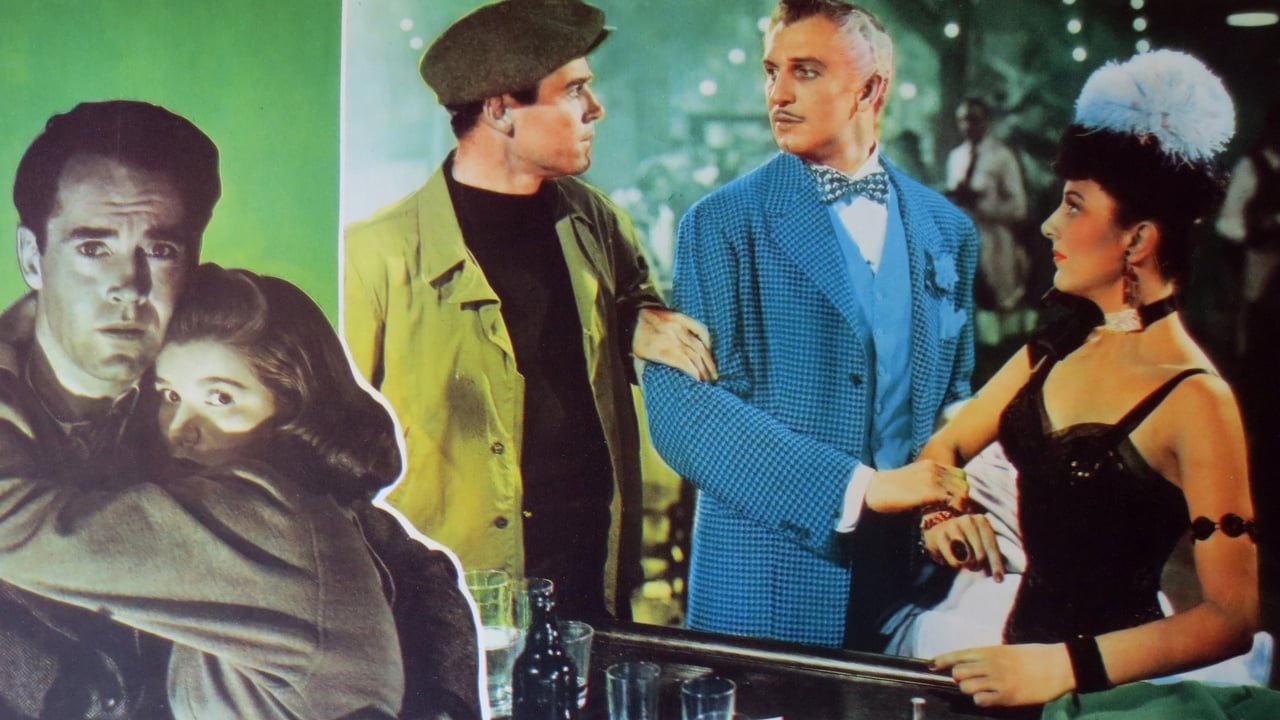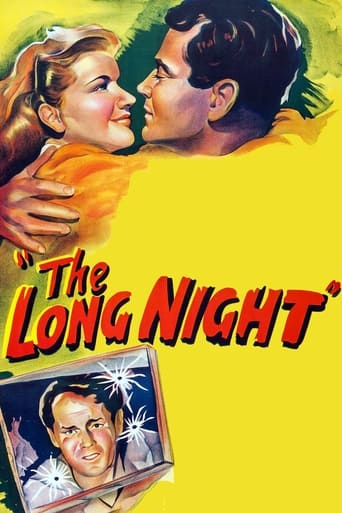



I like the storyline of this show,it attract me so much
View MoreThis movie was so-so. It had it's moments, but wasn't the greatest.
View MoreThis is one of the best movies I’ve seen in a very long time. You have to go and see this on the big screen.
View MoreWorth seeing just to witness how winsome it is.
Except for its ending, the story and plot elements are nearly identical to Le jour se lève (1939), which I didn't remember because I saw it in 2005. Fortunately I took good notes but, if the original was that forgettable, why remake it?A man exits a fourth floor apartment having been shot and tumbles down the stairs where he's discovered by a blind man (Elisha Cook Jr.) that's initially implicated in the murder. The police then discover that there's a man still in the apartment when he shoots through the door, warning them to stay back and leave him alone.We discover later that the man who was killed was a magician named Maximilian the Great, played by Vincent Price. Henry Fonda plays the man who did the shooting: Joe Adams, a former soldier that had settled down to working in a factory of a small industrial town near the border of Ohio and Pennsylvania.The rest of the story is told in retrospect through flashbacks while Joe is in a standoff with the police. Joe had met and fallen for Jo Ann (Barbara Bel Geddes in her film debut); they find that they were both from the Good Shepherd orphanage. His affections for her are quicker, and he wants to marry though - given their upbringing - both admit that they don't know much about love.But after being turned down for a date one night, Joe follows Jo to find that she's infatuated - and possibly involved - with Maximilian. Ann Dvorak plays Charlene, the magician's assistant who's finally had enough of her boss and his lying ways to quit. The two men have a brief confrontation over Charlene in the bar, then later end up having a real struggle over Jo with the magician even trying to pass himself off as Jo's absent father, now concerned about her relationship to Joe.The production code prevented producer-director Anatole Litvak (and writer John Wexley) from fleshing out that Joe ends up having a sexual relationship with Charlene, ostensibly because he has 'needs' and Jo is saving herself (for marriage?). It's when Joe finds out that Jo has been intimate with Maximilian that his fatalistic path begins, which leads to his being under siege by the police. The tacked on Hollywood ending just solidifies this one's insipidness.
View MoreThis is a brief review of "Decision Before Dawn", "Sorry, Wrong Number" and "The Long Night", three films by director Anatole Litvak.Born in the Ukraine, Litvak's career as a film-maker took him from Russia to Germany to France and eventually to Hollywood, where he became a contract director for Warner Bros. He directed "Decision Before Dawn, regarded as one of his finest pictures, in 1951. It tells the tale of Happy (Oskar Werner), a German soldier who, in 1944, defects and becomes an Ally double agent. At the command of American Colonel Devlin (Gary Merrill), Happy embarks on a mission deep behind German lines."Decision Before Dawn" was one of many Hollywood films released in the 1950s which attempted to rehabilitate Germans as "now our allies". Like the similarly themed "The Big Lift" (1950), it boasts superb location photography, Litvak filming in actual cities still scarred by war and still littered will real WW2 machinery. Whilst the film's promises of complexity are eventually betrayed, Litvak's establishing shots, handling of spaces and architecture, his grand outdoor vistas and a beautifully dour performance by Oskar Werner, elevate things tremendously. Werner would milk similar material in Martin Ritt's 1963 masterpiece, "The Spy Who Came in From the Cold". Today, "Decision Before Dawn" plays like a rebuke to Litvak's own "Confessions of a Nazi Spy" (1939), one of the first blatantly anti-Nazi films.Released in 1947, and a remake of Marcel Carne's superior "Le Jour Se Leve", Litvak's "The Long Night" stars Henry Fonda as Joe Adams, a man who blockades himself in an apartment following the murder of Maximillian the Great (Vincent Price), a nightclub magician. Via flashbacks we delve into the circumstances which led to this crime.Typical of Litvak, "The Long Night" boasts audacious camera work. Litvak's whip-pans, cranes, clever forced perspectives and snaking cameras were novel for the era, and his locations drip with atmosphere. While beautiful in a clinical way, Litvak's visuals still can't match Carne's poetic realism and the gauzy romantic humanism which made "Le Jour Se Leve" so famous. Litvak's film – noirish and brooding – also ends on a note of optimism, a reversal of the Carne's more downbeat ending. The film was a financial flop.Litvak released "Sorry, Wrong Number" (1948) a year later. A precursor to high-concept, modern thrillers, "Number" stars Barbara Stanwyck as Leona, a crippled woman who overhears a murder plot on her telephone. From her bedroom – the film's base of operations – Litvak's camera embarks on a dizzying quest to avert the crime, dipping into the past, different locations, through telephone lines and back out again."Sorry, Wrong Number" was based on a Lucille Fletcher radio play, which Litvak's aesthetic attempts to break free from. He glides from New York suites to State Island beaches to Manhattan skylines, but the film's print-oriented origins are hard to escape. Interestingly, Stanwyck's character is revealed to suffer from psychosomatic issues, and it is her very own flights-of-fancy, her constricting nature (epitomised by her crippled legs) which results in the film's central crime. Leona smothers her lover (Burt Lancaster), wants to make him as immobile as she is, a fact which pushes him into criminality. Throughout the film, Leona's stationariness is thus contrasted with the film's countless telephones and telephone wires, devices which seem to enable and amplify Leona's neuroses. Rather than connecting her to the outside world, these wires alienate Leona further, wrapping her up in paranoia and further illusions of control. Litvak followed "Number" up with "The Snake Pit", "Wrong Number's" thematic mirror image.7.5/10 – Worth one viewing. See "Young Man With a Horn" (1950) and "The Clock" (1945).
View MoreIt's too bad THE LONG NIGHT couldn't have been a short one.This is a disastrously dull movie with HENRY FONDA and BARBARA BEL GEDDES both playing implausibly motivated people who fall in love at first sight. Fonda plays another one of his "everyman" roles but is more of a lost puppy than usual in this depressingly dark noir directed without his usual style by Anatole Litvak.The first twenty-five minutes had me wanting to switch the movie off, it was so poorly constructed. I found it impossible to watch the whole thing.If any kind of film noir is your thing, you may stick around to see the whole movie. I found it a frustrating waste of time and certainly not a film that Fonda or Bel Geddes should be proud to have on their resume.
View MoreEerie film showcasing an excellent chain-smoking Henry Fonda as a distraught lover who kills the eerie mad-like magician,Vincent Price, who discovers his girl-friend, Barbara Bel Geddes and begins to stalk here.The acting here is good especially by Fonda, who wears the same hat and acts in a similar fashion as he did in "The Grapes of Wrath." He is essentially a beaten down character, at war with society who vacillates between pessimism and optimism.Bel Geddes is outstanding especially in the latter part of the film. Her justification for living would ever serve as an inspiration to Bishop Fulton J. Sheen.Ann Dvorak, as the mysterious Charlene, is also quite good. The film is really uneven as it doesn't explain why the Fonda character becomes involved with Charlene, Price's assistant in his magic.
View More